Global study looks to improve lives of individuals with congenital condition

A major five-year study led by researchers at the University of the West of England (UWE Bristol) and Seattle Children’s Hospital will explore how best to improve healthcare and support services for individuals born with craniofacial microsomia (CFM), a complex long-term condition present from birth that most commonly affects the ears and jaw.
The $3 million (£2.2m) research project, funded by the National Institutes for Health in the USA, will investigate the psychological and health impacts of the condition and explore the healthcare provision needed to treat and support individuals and families effectively.
CFM is a congenital condition that occurs in approximately one in every 3,500 - 4,000 births in the UK. One or both sides of the face are underdeveloped, affecting the form and function of the ears, eyes, cheeks, jaw, and/or teeth. Individuals born with the condition can experience difficulties with hearing, breathing, feeding and speech development, and their facial appearance is often affected.
The complexity of the condition means that many individuals undergo multiple surgeries and take part in a range of treatments throughout childhood and into adulthood. This, alongside an altered facial appearance, can greatly impact quality of life for individuals and their families.
Despite the anticipated psychological impact of the condition and the complexity of treatment, healthcare and psychological research is scarce and previous studies have been small in scale.
This project brings together an international team of experts in research, clinical care, and patient advocacy for individuals with CFM. Its mission is to serve the craniofacial microsomia community, which includes individuals born with CFM, their families, healthcare teams, researchers, advocacy groups, education providers, policy makers, and members of the public. The researchers will look to learn about the lived experiences of the community to improve wellbeing and to make a lasting difference to how individuals live with the condition.
Senior Research Fellow Dr Nicola Stock, who is leading the project from UWE Bristol and works out of its Centre for Appearance Research, said: ‘‘This project represents a huge investment into an area that is significantly under-researched. We're delighted to be working with an international team with a wide range of expertise, and to be partnering with a number of prominent charities and advocacy groups.
“Together, our community has the potential to make a significant contribution to knowledge and to the care that affected individuals and families around the world receive.’’
The study will see researchers speaking to individuals, parents, health providers, and advocacy leaders across the US, UK, Europe, and Australasia, and will involve interviews, surveys, and an international participant registry.
Paediatrician and Professor Dr Carrie Heike, who is leading the project from Seattle Children’s Hospital and works in its Craniofacial Centre, said: “We have an unprecedented opportunity to hear from over 1,000 participants in this five-year project. I’m looking forward to learning throughout the study and translating this knowledge into improving healthcare delivery for individuals with craniofacial conditions.”
Maarten Koudstaal, Consultant Craniomaxillofacial Surgeon at the Erasmus Medical Center in the Netherlands is one of several international partners working on this project. Dr Koudstaal said: “Surgery is a minor part of the life story of these individuals and this research really jumps into the gap of gaining knowledge about the psychosocial challenges and holistic needs. My view of the future is that individuals will be helped to make choices about what is most important for them and when, and that their journey is their own, not a fixed care pathway for all.”
More information about the study is available on the CARE website.
Related news

12 December 2025
UWE Bristol’s environmentally conscious and student-focused accommodation wins three awards
Purdown View, the world's largest certified Passivhaus student accommodation development, has been recognised at Property Week Student Accommodation Awards.

13 November 2025
Alliance Medical and UWE Bristol launch UK’s first PET-CT postgraduate certificate
In a move set to transform imaging education, Alliance Medical (AML) and UWE Bristol have joined forces to co-design and develop the UK’s first PET-CT Postgraduate Certificate (PG Cert).

10 November 2025
Lessons from Low Traffic Neighbourhoods will drive better public engagement, study finds
Lessons from Low Traffic Neighbourhoods have informed a new toolkit to improve engagement with the public on challenging local street issues.

29 September 2025
Smartphone use hitting struggling pupils hardest, major study finds
Young people struggling with their studies at school are much more likely to have negative experiences on their smartphones than their better performing peers, a major new study has found.

11 September 2025
New study to investigate augmented reality as an intervention for emotionally based school avoidance
A UWE Bristol researcher will support a new study exploring whether an augmented reality board game can help young people with emotionally based school avoidance (EBSA).
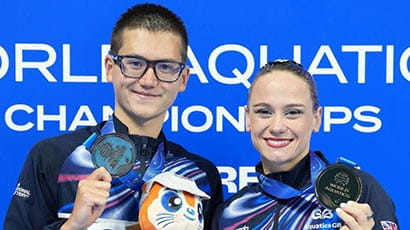
28 July 2025
Student wins bronze medal at World Aquatics Championships on her graduation day
UWE Bristol sports rehabilitation student Izzy Thorpe made waves at the World Aquatics Championships winning a bronze medal in artistic swimming on the same day she was meant to be crossing the stage at her university graduation ceremony.

28 May 2025
Leading organisations fighting to end youth violence in cities join UWE Bristol event panel
Leaders from Bristol-based Empire Fighting Chance and Canadian non-profit REACH will speak at the next Bristol Distinguished Address Series.
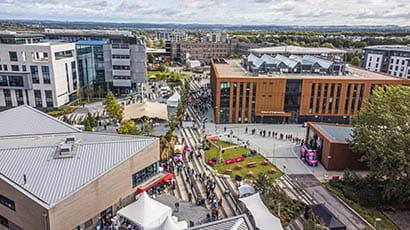
09 May 2025
UWE Bristol among first universities in UK to introduce sanitary waste bins in male toilets
UWE Bristol is among the first universities in the UK to introduce sanitary waste bins in male toilets for the disposal of incontinence products.
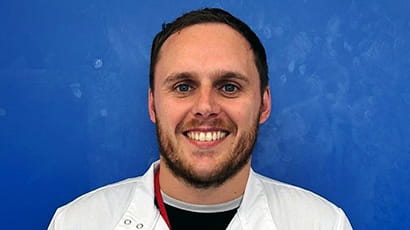
11 April 2025
UWE Bristol academics among emerging scientific leaders to receive share of £7.6m for health research
Two UWE Bristol researchers are among the recipients of a £7.6 million investment from the Academy of Medical Sciences aimed at tackling urgent health challenges.
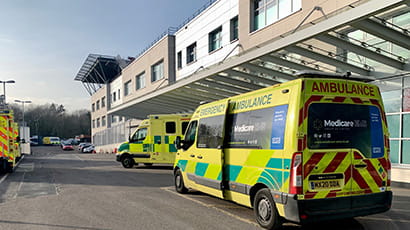
09 April 2025
New research to support a thriving health and care workforce is launched
A national research partnership will explore ways to support wellbeing and sustainability in the NHS and social care same day and urgent care workforce.
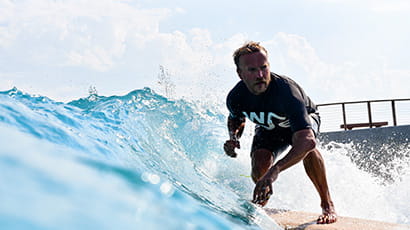
10 March 2025
UWE Bristol to explore the power of open water swimming at upcoming event with The Wave founder Nick Hounsfield
An inspiring tale of grit and resilience will be told to audiences at the first BDAS event of 2025 as UWE Bristol welcomes Nick Hounsfield, founder of The Wave.

28 February 2025
Paramedics in GP surgeries may ease workload but not NHS costs, study finds
Paramedics working in GP surgeries help reduce GP workload but do not contribute to cost savings to the NHS, according to the first major study of the clinical and cost-effectiveness of paramedic compared with GP consultations.






